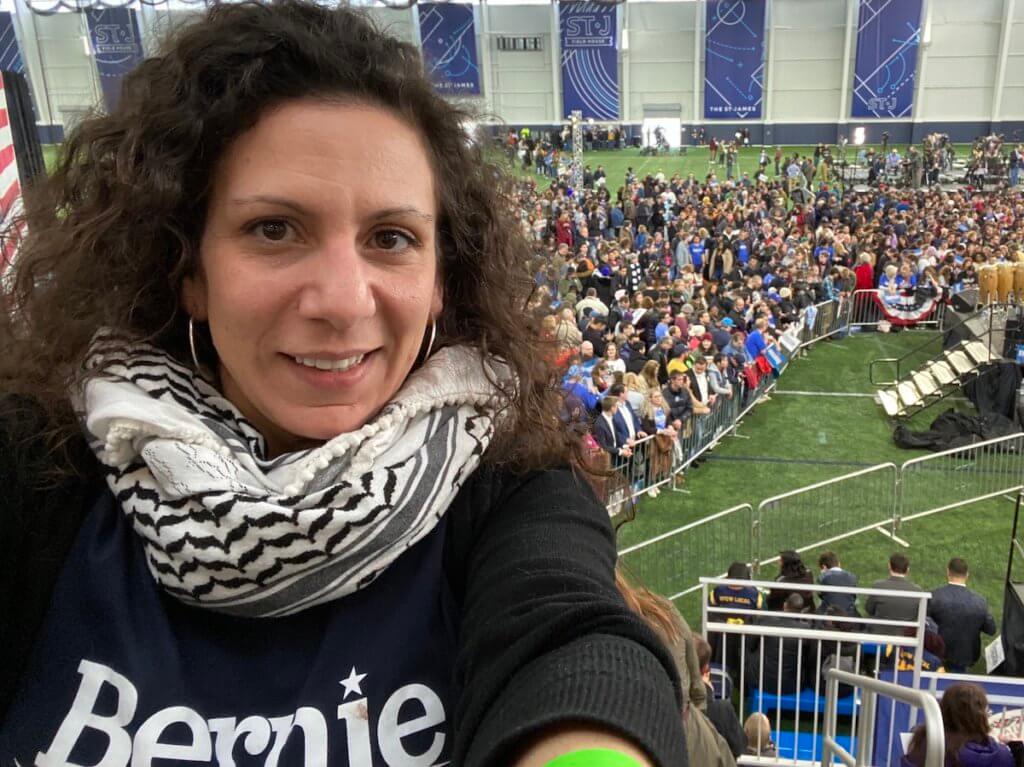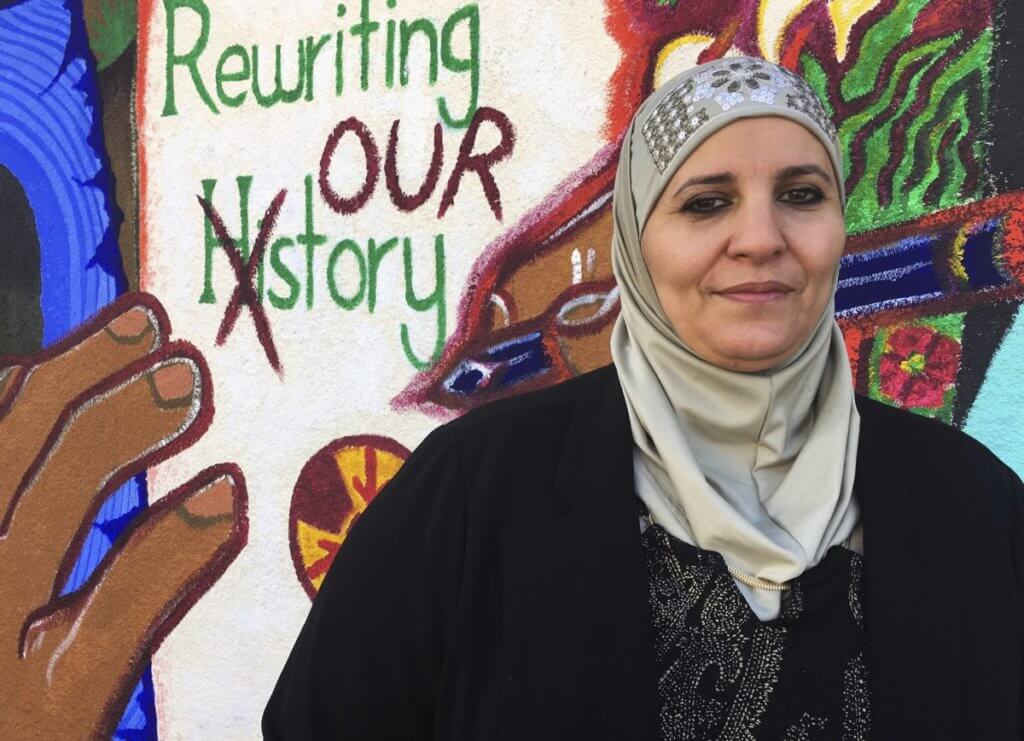The concerns of Palestinian-American delegates to the Democratic National Convention (DNC) went unheeded earlier this week as the 187-member platform committee, comprised of Biden, Sanders, and party leader delegates, stuck with draft platform language reinforcing the hidebound, failed policies of the Obama administration on Israeli-Palestinian issues.
It expresses “ironclad” commitment to unconditional funding for Israel’s atrocities against the Palestinian people. It also conveys tepid support for Palestinian statehood and opposition to Israeli annexation, but fails to press Israel in any meaningful way to end its military occupation and stop its land grab.
According to a document shared with Mondoweiss, Palestinian-American delegates to the DNC authored an amendment that included conditioning military funding to Israel, ending Israeli occupation, opposing Israeli settlements, asserting Palestinian rights to Jerusalem, excising a discriminatory reference to Israel as a Jewish state, and calling for equal rights between Palestinians and Israeli Jews.
“Expressing unwavering support for a country that continues to thumb its nose at international law while it steals Palestinian land, entrenches apartheid, and denies our families’ basic human rights is unacceptable.”
In a powerful letter to the platform committee that accompanied the amendment language, eight Palestinian-American DNC delegates from Virginia, Michigan, Texas, California, and New Mexico expressed their outrage at the DNC for excluding Palestinian-American voices from the drafting process while pro-Israel lobbyists openly bragged about their efforts to strip out language critical of Israel.
“Expressing unwavering support for a country that continues to thumb its nose at international law while it steals Palestinian land, entrenches apartheid, and denies our families’ basic human rights is unacceptable. It is unacceptable to us; it is unacceptable to a growing majority of the Democratic Party; and it should be unacceptable to every American who aims for true freedom, justice, human rights, and democracy,” they wrote.
Their amendment language was duly submitted to the DNC by a Sanders delegate to the platform committee but was not brought up for a vote. It is unclear what happened to this amendment language, as determinations about amendments happen behind closed doors, but its omission from the process further reinforced the marginalization of Palestinian-American voices.
The opaque nature of the platform process was made even more murky this year because of coronavirus restrictions. The virtual, tightly controlled public sessions stood in contrast to the more free-wheeling and raucous deliberations of the committee four years ago.
A skewed debate

The DNC’s disregard for Palestinian-American concerns was particularly galling to Zeina Ashrawi Hutchison, a Sanders DNC delegate from Virginia, who told Mondoweiss that “It’s not surprising that the Israel lobby was in full control of the platform on Palestine-Israel. But what is shocking is how out of touch the party and its leadership are with the people that it claims to represent. If the goal was party unity, they’ve failed and managed to alienate the majority. Human rights are non-negotiable and the Palestinian people’s right to freedom and self-determination will overcome Israeli apartheid and oppression.”
Samia Assed, a Sanders DNC delegate from New Mexico, asked, “How can I ask my community to support the Democratic Party while they don’t support our cause? How can I discuss my engagement with the party with my nine children?”

Rather than uplift the concerns of Palestinian-American delegates to the DNC, the platform committee chose instead to debate and defeat a weaker amendment prompted by non-Palestinians.
Clem Balanoff, a Sanders delegate to the platform committee, offered amendment language to condition military funding to Israel on human rights standards, to call for an end to military occupation, and to oppose Israeli settlements rather than only their expansion.
The Balanoff amendment appeared to be inspired by a joint op-ed written by Jeremy Ben-Ami and Jim Zogby, presidents of J Street and the Arab American Institutes, respectively.
The impact of Balanoff’s strong speech to the platform committee was diluted, however, by his repeated invocations of former Israeli Prime Minister Ariel Sharon’s statement (later retracted) opposing Israeli military occupation. The Sharon references encapsulated everything that was problematic in the DNC platform process: Palestinian rights cannot be acknowledged, much less supported, without the approbation of their oppressors.
To bolster this dynamic, the co-chairs of the platform committee allowed two former Obama administration officials–Ambassadors Dan Shapiro and Wendy Sherman–both of whom were intimately involved with its Middle East policy-making and who have deep connections to Israel and the Jewish-American community, to slap down the amendment.
Their tag-team effort was an outlier to an otherwise strictly balanced amendment process in which only one speaker was permitted to each side before voting took place.
Signs of progress
Since Biden delegates were allocated the vast majority of seats on the committee, reflecting the overall distribution of DNC delegates between Biden and Sanders, the outcome of the amendment was never in doubt. The 34-117 vote count, with five abstentions, more or less mirrored the Biden-Sanders split on the committee with some notable exceptions.
For example, Biden delegates Farhana Khera, Executive Director of Muslim Advocates, and Khurrum Wahid, chair of Emgage Action, voted for the amendment, suggesting a path forward for Muslim-American engagement with the Biden campaign to improve its position on Palestine.
Palestinian-Americans and their allies might be able to take some cold comfort from the fact that the platform includes for the first time a provision to uphold free speech rights to engage in boycott, divestment, and sanctions (BDS) campaigns for Palestinian rights.
It is not an insignificant departure, as the previous DNC platform opposed BDS, while the 2016 and recycled 2020 Republican platform not only deemed BDS “anti-Semitic” but called for “effective legislation to thwart” the movement. During the past four years, this disregard for constitutional norms has empowered a bipartisan group of elected officials at the state and federal levels to propose and enact legislation to penalize and even criminalize BDS proponents.
At least under a Biden administration, BDS advocates would not have to fear federal prison time for coordinating with the UN to boycott Israeli settlement goods, as was proposed in the Israel Anti-Boycott Act by Sen. Ben Cardin (D-MD) in 2017.
However, this is the only redeeming feature of a platform that is otherwise hostile to Palestinian rights and inconsonant with the sentiments of the base of the party.
With much of the DNC being virtual this year, it is unclear if Palestinian-American DNC delegates will have the opportunity to mobilize their fellow delegates to display solidarity with Palestine as was evident on the floor of the 2016 DNC delegation.
The 2020 DNC platform, like Biden himself, is a throwback to an outmoded display of Democratic fealty toward Israeli apartheid. Despite the abominable platform language, through strategic organizing, those who support Palestinian rights can ensure that the next Democratic platform more accurately reflects the base of the party’s support for Palestinian freedom, justice, and equality.
The writer is an active member of the Fairfax County (Virginia) Democratic Committee.



The establishment Democratic Party is tired, old and out of touch with its base, just like its putative leader, Biden.
You’d think that including Palestinian-American voices in the platform drafting process would actually improve the chances for some kind of fair resolution, and you’d think that a resolution to the conflict is in America’s interest, no? Back around 2010 David Petraeus said that the conflict was harming U.S. interests. Here’s another comment on that from a Brookings talking head –
“The Israeli-Palestinian conflict is a national security threat to America. Indeed, American lives are being lost today because of the perpetuation of the Israeli-Palestinian conflict. A peace agreement is a, if not the, key to achieving most of our goals in the greater Middle East.”
https://mepc.org/israeli-palestinian-peace-what-us-national-security-interest-how-can-it-be-achieved
The more things change, the more they remain the same. Israel’s “occupation” of the US Congress, will go on for the rest of our lifetime. You would expect at least the Democrats to show some spine and make that bold move, that will be the beginning of the end of this ridiculous situation. Israel is losing it’s clout in many ways around the world, BDS is growing stronger, and it seems just like the Coronavirus pandemic, the US will be one of the last nations to curb and control Israel’s damaging influence over our nation. It is very unfortunate.
I urge all people of conscience who are wounded in their souls by what has happened to Palestine to give a good look at the Libertarian Party and its candidates. https://jo20.com/
Remember Dem platform in 2012….. Ohio Governor Strickland “Obama recognizes capital of Israel is Jerusalem”
https://www.youtube.com/watch?v=t8BwqzzqcDs